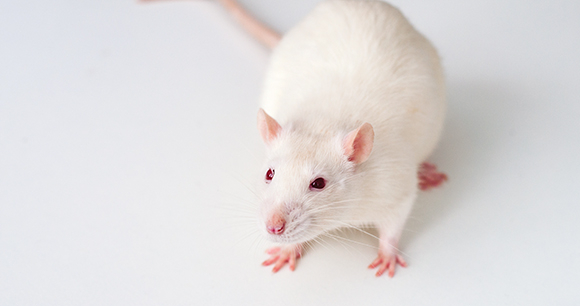
Washington, DC—The Animal Welfare Institute (AWI) has filed a complaint with the National Institutes of Health (NIH), raising significant issues about Baylor University’s mistreatment of rats in an undergraduate Learning & Behavior Lab course and the institution’s failure to respond to AWI’s documented concerns.
Students taking an undergraduate psychology class at the Texas university were led to believe that the approximately 60 live rats enlisted in their experiments would not be euthanized at the end of the class. When the truth came out, at least one student reportedly implored the instructor and the department chair to have the rats adopted, placed in a sanctuary, or kept as class pets, but his plea was denied. When the student asked why he and his classmates were not given information concerning the planned euthanasia, the instructor reportedly told him that it was better for students not to know.
Baylor’s failure to respond to AWI’s April 14 letter requesting specific information about the university’s policies governing live rats raises serious questions about accountability and animal welfare at the university, the organization noted.
The letter also urges the NIH to investigate the animals’ mistreatment for potential violations of the Public Health Service Policy on the Humane Care and Use of Laboratory Animals (PHS Policy), which must be complied with by research facilities such as Baylor that receive federal funds. Compliance with PHS Policy is monitored by the NIH’s Office of Laboratory Animal Welfare. Baylor received more than $5.8 million from the NIH in fiscal year 2022, a portion of which was earmarked for experiments involving live animals.
The PHS Policy requires that a facility’s internal Institutional Animal Care & Use Committee (IACUC) review concerns about the care and use of animals. Baylor’s IACUC apparently approved the use of live rats in the lab for nearly two decades, most recently in the fall of 2022. The lab in the Department of Psychology and Neuroscience aimed to teach students how to condition a rat to pull a lever on command to get a sip of water as a reward.
In a Jan. 30 letter delivered to Baylor President Linda Livingstone and other top administrators, AWI expressed grave concerns about the university’s oversight failures, including allowing the rats to live in social isolation in shoebox cages and be deprived of water for 23 hours a day.
“Social species suffer when deprived of companionship, and here, there is no scientifically justifiable reason for the rats to be housed alone,” AWI wrote, referencing the federal “Guide for the Care and Use of Laboratory Animals.”
Moreover, the lab manual for the Baylor course contained inappropriate jokes about the rats’ “solitary confinement” and their eventual demise if they didn’t press the lever.
In response to the following question in the manual’s FAQ section: “What happens to these rats when the lab is finished?” it stated that “these rats … are used by other Baylor researchers for numerous other purposes…Rest assured however that all animal research at Baylor University is conducted using ethical and humane guidelines and under the supervision of Baylor’s Animal Care and Use Committee.”
Dr. Bradley Keele, the interim department chair who also chairs Baylor’s IACUC, later reportedly said that the lab’s IACUC-approved protocol dictated that the rats be euthanized. (This protocol could have been amended, according to AWI.)
“Baylor University should have in place a robust adoption policy, not only for the healthy rats used in this lab, but for all suitable animals used throughout its research programs,” said Dr. Joanna Makowska, AWI’s laboratory animal advisor.
Live rats were not even necessary for this lab. The ethical use of animals in science, including science education, mandates that animals should be used only if the research/learning objectives cannot be achieved using non-animal methods. “Sniffy the Virtual Rat” software, for instance, is already used extensively and often exclusively by many universities. Baylor itself uses the software but supplements it with live animals.
In response to AWI’s first letter, Baylor officials wrote that the IACUC had conducted a complete review of teaching protocols involving live rats, and the lab manual for the course had been corrected to “reflect more accurately the policies and procedures of Baylor and the actions and requirements of the IACUC.” They also noted that Baylor had “re-enacted a formal animal adoption program” as an alternative to euthanasia.
Dissatisfied with the university’s vague response, AWI sent a second letter in April, specifically asking about the outcome of the IACUC review and whether the university would continue to use live rats for teaching, among other issues. The group also raised concerns about Baylor’s institutional culture and attitudes of staff (e.g., reported comments from a former Baylor laboratory animal assistant that research mice and rats are “living the plush life”).
Baylor has not yet responded, which prompted AWI to file its complaint on June 21. The Baylor student who initially expressed alarm about the rats being killed has also contacted the NIH.
According to AWI, the situation at Baylor is not an anomaly. Similar conduct at other universities often escapes federal enforcement and sanctions because IACUCs have wide discretion and little accountability.
“The Baylor case amply illustrates that ‘compliant’ and ‘humane’ are not synonymous,” Makowska said. “Until an oversight system emerges that truly does emphasize animal welfare as the top priority, ‘compliant’ will continue to allow for animals to be misused and mistreated in research, testing, and teaching.”
Marjorie Fishman, Animal Welfare Institute
[email protected], (202) 446-2128
The Animal Welfare Institute (awionline.org) is a nonprofit charitable organization founded in 1951 and dedicated to reducing animal suffering caused by people. AWI engages policymakers, scientists, industry, and the public to achieve better treatment of animals everywhere—in the laboratory, on the farm, in commerce, at home, and in the wild. Follow us on Facebook, Twitter, and Instagram for updates and other important animal protection news.